Nationalist groups in Romania have seized on a Romanian woman’s child custody fight in Finland as evidence of the corrupted values of the West.
By Ani Sandu
Shortly after midday on a sunny Saturday in early February, a crowd of around 50 people gathered on an otherwise quiet street-corner in the Romanian capital, Bucharest. Over the road stood the Finnish embassy, housed in a villa with small columns and arches dating to the interwar period.
Clutching Romanian flags, the crowd of men, women and children chanted “Freedom!” and “Down with the Nazis!” A banner read, “Stop the destruction of the Romanian family”.
A bearded man wearing a black jacket and a wooden cross around his neck bellowed into a megaphone:
“You realise which Europe we want to be in, in which Europe they want us to go – a Europe that turns Islam into a culture, that places value on homosexuality, but which condemns children’s love for their mother.”
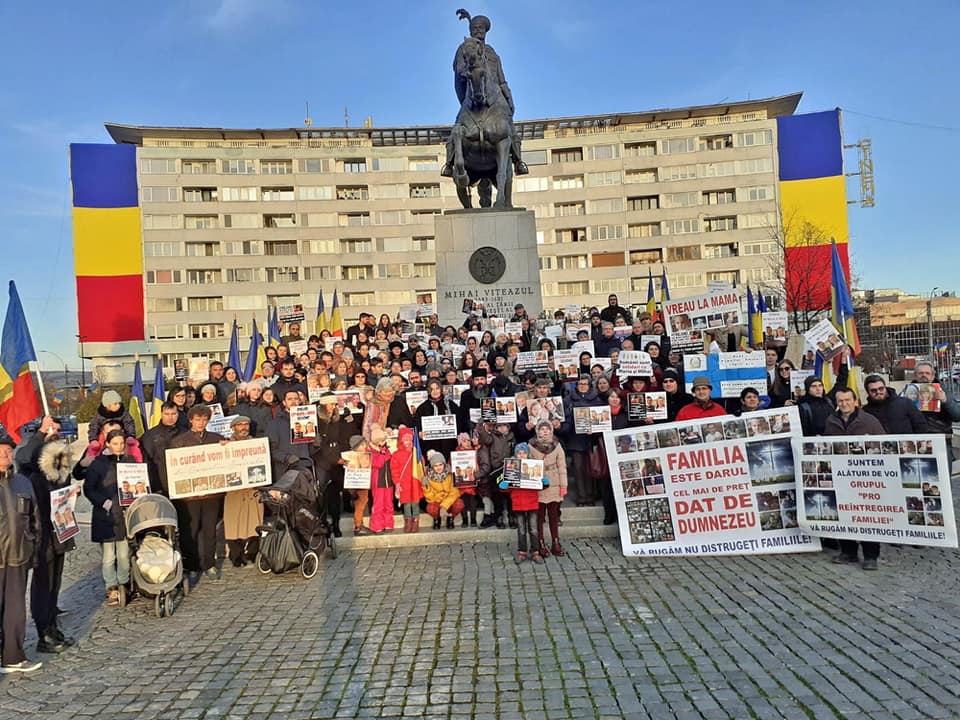
The mother in question is Camelia Smicala, a Romanian woman in Finland whose children were taken into care after the break-up of her marriage to a Finnish man in 2010.
The man in the black jacket and wooden cross was Dan Grajdeanu, the 48-year-old leader of the Orthodox Brotherhood, a Romanian nationalist organisation that claims to number some 2,000 members and promotes “love of God, nation and country.”
Grajdeanu and Smicala have never met, but that has not stopped Grajdeanu from seizing on Smicala’s story and turning it into a cause célèbre for right-wing and ultra-Orthodox religious groups in Romania.
To such groups, Smicala’s story is evidence of how far Europe has veered from perceived “traditional family values”, such as the right of a mother to raise her children. And Smicala, trying to regain custody, has played along.
The co-opting of her story by the Romanian political right has become a lesson in how personal narratives – particularly in the social media age – are used to manipulate opinion against the European Union.
“People act out of their own instinct, from their own beliefs, but of course there is a hand that organises things behind the scenes and then amplifies the message, makes it more visible,” said political analyst Sorin Ionita, head of the Bucharest-based Expert Forum think tank.
“It happens frequently in the Baltic countries, in Poland,” he said. “These types of groups are potentiated to make what is in the end anti-EU propaganda. Some make it knowing what will happen, others don’t realise and act sincerely.”
Children placed in care
An emergency physician from the eastern Romanian city of Piatra Neamt, Smicala left Romania for Finland in 2005 and had two children there with her Finnish husband, Petri Jalaskoski.
Smicala, isolated by the fact she did not speak Finnish, says Jalaskoski became abusive and that on one occasion in 2007 she took the children to a shelter for victims of domestic abuse.
Smicala began working as a doctor and in 2010 the couple divorced. BIRN tried to reach Jalaskoski via a company email address but received no reply. He does not appear to have commented publicly on Smicala’s allegations and the Romanian Foreign Ministry told BIRN he has not been charged with a crime.
According to the Romanian Foreign Ministry, a Finnish court ruled that the children would live with Smicala and that the parents would have joint custody. In 2016, however, Finnish social services decided that the children, then aged nine and 10, should be placed separately into care. The Finnish social services declined to discuss the case with BIRN but the Romanian foreign ministry said the reason cited for the decision was the “unstable behaviour of the mother, damaging the development of the children.”
Smicala took to Facebook, accusing Finland of violating her human rights and ruling against her because she was Romanian. On YouTube she uploaded audio recordings and videos of her children when she was allowed to visit them, resulting in her visitation rights being removed.
Her story, however, was gaining traction in Romanian media and online.
Many of those who came out in support were members of ultra-Orthodox religious groups known for their anti-Western, anti-LGBT stands.
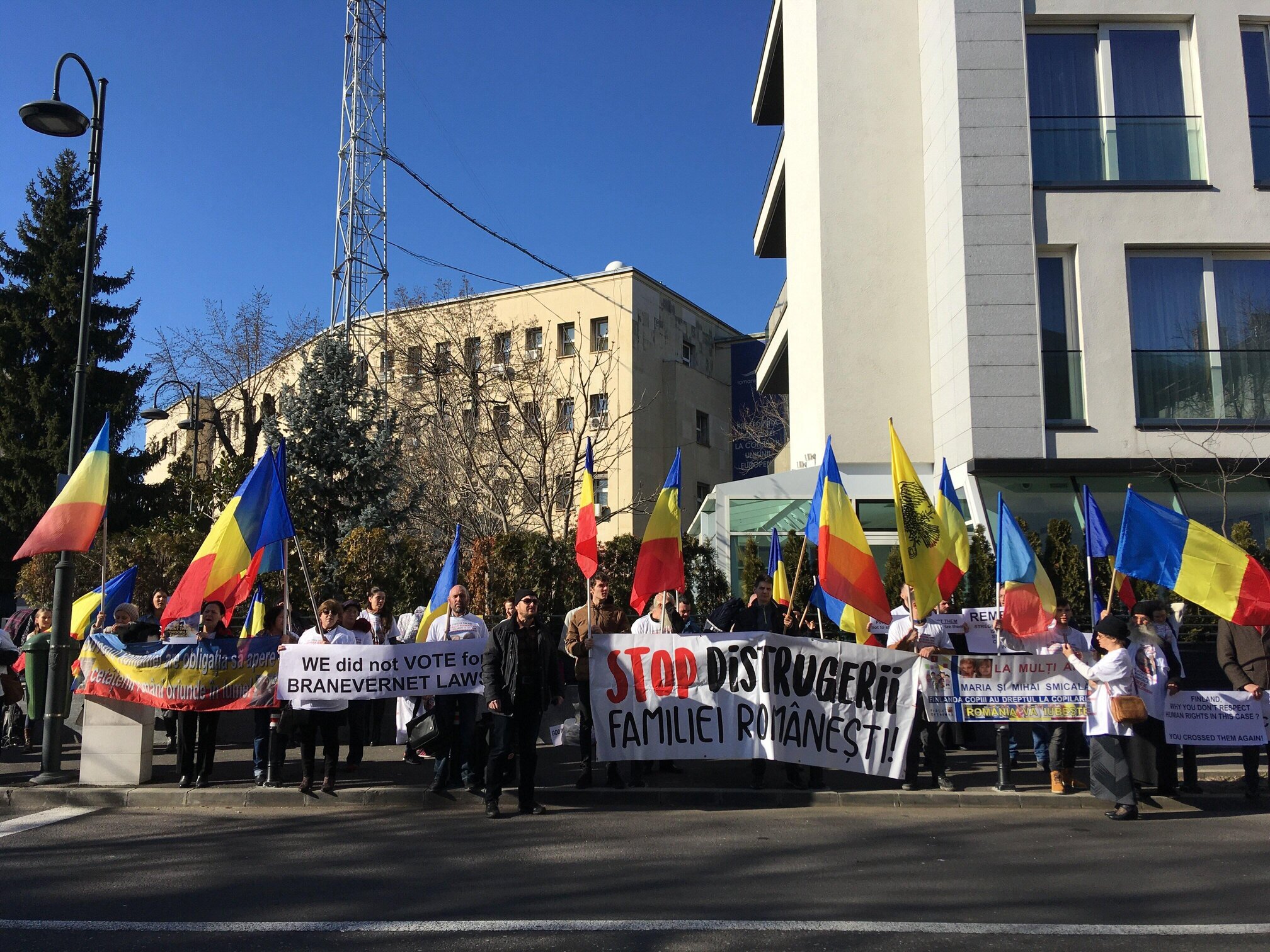
Grajdeanu was one of the first in the queue.
A dog trainer and former police officer from the city of Ploiesti some 60 kilometres north of Bucharest, Grajdeanu first came to public attention in 2018 when he participated in a protest at which a far-right organisation called The New Right stormed the screening of a movie they claimed was “homosexual propaganda”. He went on to stage protests against same-sex marriage and Muslim migrants.
His support for Smicala dates to 2017. “The greatest crime is to take children from their mother,” he said at one early protest outside the Finnish embassy.
Grajdeanu told BIRN he had been moved by her pain.
“If I find a Romanian suffering somewhere, I go there to fight so that more don’t suffer, so that the evil doesn’t spread,” he said to BIRN. “We should at least isolate it or do something. I mean, we are in a fight against evil and in defence of good.”
Grajdeanu’s protests have been interrupted by the COVID-19 pandemic, but he said the support for Smicala would go on.
Political backing
Smicala’s complaints against Finland started gaining traction on Orthodox websites and Facebook groups in 2016, which cited her story alongside that of a Romanian man who accused Britain of giving his children up for adoption to a gay couple and a Romanian couple in Norway whose children were taken into care after the parents were accused of hitting them.
“Dear folks, everywhere in Europe they are taking away our kids!” one person posted on the Romanian website cuvantul-ortodox.ro in May 2016. The site features 57 articles concerning the Smicala case; some link to videos of priests supporting her cause.
By 2017, Smicala had her own blog – ‘camelia-smicala-vs-finland’ – that was administered by a Romanian journalist called Victor Roncea. A Facebook page supporting Smicala has 12,000 followers.
Some Romanian politicians, including MPs and a Romanian MEP, Maria Grapini, have spoken out in support of her.
Her campaign reached new heights in 2019, during campaigning for Romania’s presidential election, when then acting Prime Minister Viorica Dancila, a presidential candidate, told a news conference she had spoken with Smicala by phone and, as a mother, was moved by her story.
“I will do everything I can to help a mother fighting for her children,” said Dancila, who lost the election.
In early 2020, the protests outside the Finnish embassy became a weekly event, at least until Romania locked down to combat the spread of COVID-19.
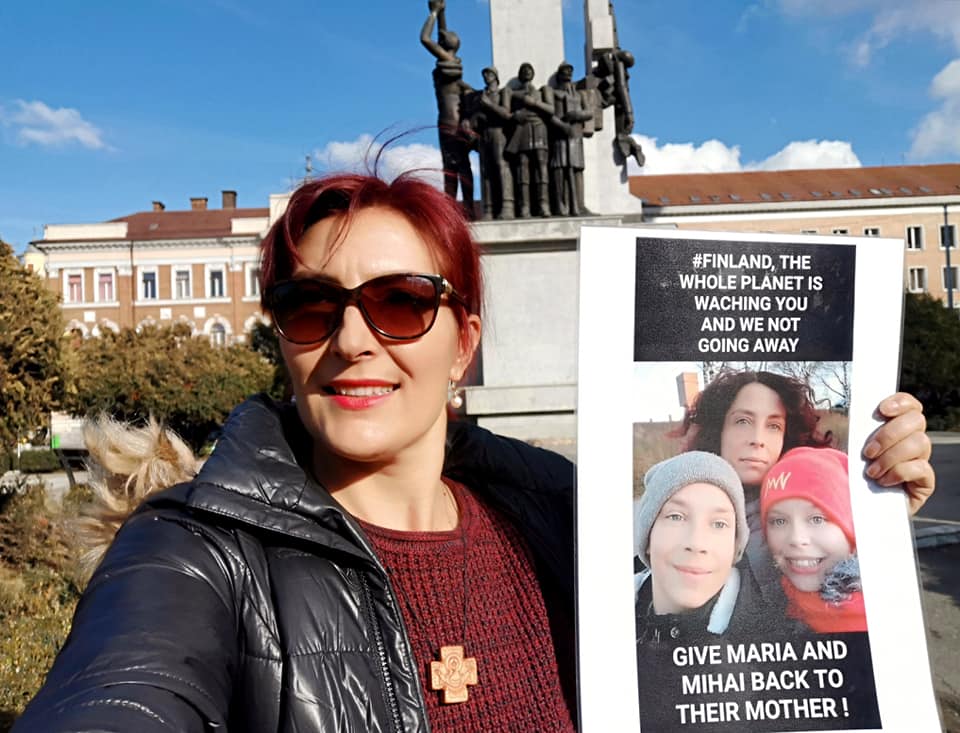
“People must understand if this happened there, tomorrow it can happen to them too here,” said Angela Negrota, a regular protester who liked to livestream the event on Facebook.
Another told BIRN she kept up to date on Smicala’s case via Platforma Impreuna, one of the main groups behind a 2018 referendum to ban same-sex marriage in Romania. The plebiscite failed due to low turnout.
Platforma Impreuna is a group of conservative NGOs and has emerged as one of Smicala’s biggest supporters, organising public events and protests and offering legal advice to her. The deputy president of Platforma Impreuna, Ana Corina Sacrieru, is working pro-bono as a lawyer for Smicala.
BIRN contacted Sacrieru for this story but she did not respond to a request for comment.
Ionita, the political analyst, said he suspected outside influences were at work:
“These people coordinate and learn,” he said.
“They develop a know-how that afterwards moves from country to country. When you have the opportunity to apply it in Poland, you apply it in Poland and you start a campaign there about I don’t know which Polish family that suffered I don’t know what in the Netherlands, for instance.
“Then, when you have the chance, you transfer this type of action to Romania.”
The Internet, he said, had enhanced the reach of such campaigns and the impact could be greater during times of crisis, such as the COVID-19 pandemic.
“When there is fear in society, a lack of equilibrium, when people suddenly become anxious – that’s when these things work much better and spread like fire on a prairie. And that’s the big danger.”
Church support
The Orthodox Church in Romania, where 85 per cent of people identify themselves as Orthodox Christian, has also got involved.
Before his death in 2013, Smicala was in touch with a Romanian monk called Father Iustin Parvu, who dabbled in conspiracy theories.
Similarly, Grajdeanu credits Parvu with changing his life and encouraging people “to go out and act.”
In 2017, two Orthodox figures – Piatra Neamt archpriest Valentin Tofan and Petru Voda monastery abbot Hariton Negrea – took part in a protest in support of Smicala.
And Smicala said she has also received help from Bishop Macarie of the Romanian Orthodox Church’s Diocese of Northern Europe, based in Stockholm, Sweden.
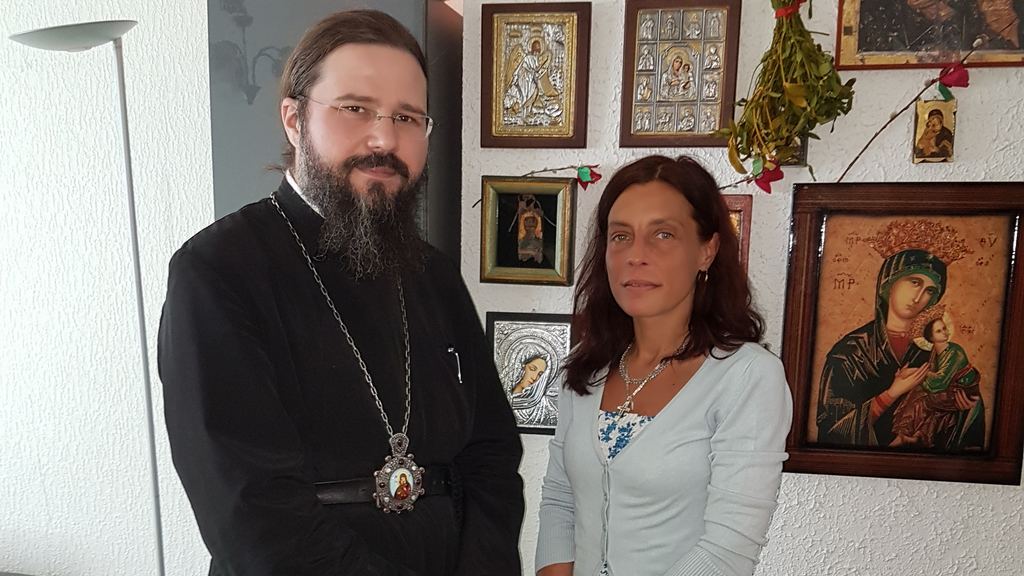
“Bishop Macarie helped us financially, he prays for us every day, I speak with him almost daily,” Smicala told BIRN.
In February this year, before COVID-19 shut down much of Europe, Smicala attended a prayer event hosted by Macarie in Stockholm.
“A mother’s love and brotherly love are the most profound and strong human attachments,” Macarie told those in attendance.
“Unfortunately it is terrible when a war starts against these, when motherly and brotherly love and the needs of a family are trampled on,” he said, according to a video of the event posted on his YouTube account.
Macarie did not respond to a request for comment for this story.
Vasile Banescu, a spokesman for the Romanian Orthodox Church, told BIRN that Smicala had the Church’s “full moral support” for her “painful situation”.
Iulian Fota, a security expert and former presidential adviser, said that while the Romanian Orthodox Church always had a “fundamentalist wing”, the Church on the whole was “the most Western in all of Central and Eastern Europe.”
Every time Romania draws closer to the West, however, it triggers “a resistance to modernisation”, Fota told BIRN. When cases like Smicala’s emerge, “they are amplified; they are distorted.”
Dani Sandu, a Romanian sociologist, suggested conservatives may be going on the offensive of late because they feel they are losing power, pushing for laws against gay marriage, abortion and gender studies.
“The number of people who are open to this type of discourse gets smaller, but the radicalisation of the discourse grows significantly,” Sandu said.
Romanian state “in constant discussions” with Smicala
The Finnish embassy in Bucharest declined to comment on Smicala’s particular case, citing legal constraints and the European Data Protection Regulation.
It did say, however, that, placing a child into state custody “always represents the last resort, to which the state appeals only if it is absolutely necessary for the protection of the child.”
Smicala appealed against the decision in court but lost.
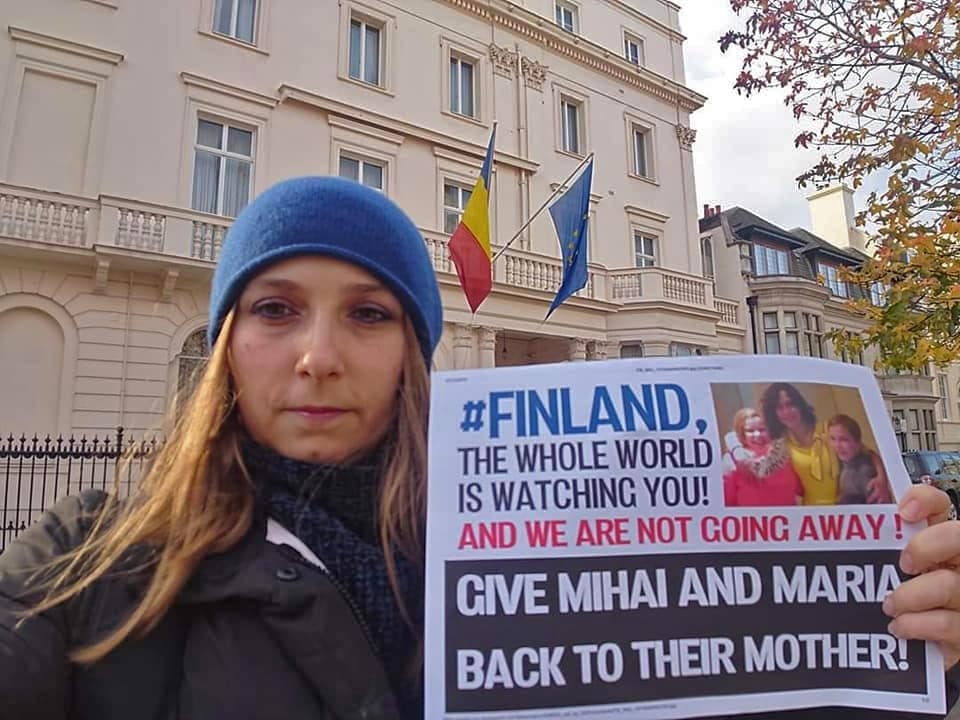
Romania, meanwhile, says its diplomats in Helsinki spoke with the Finnish child protection services and attended court when Smicala’s case was being heard. The Romanian ambassador, Razvan Rotundu, also visited the children in September 2017.
“The mother was given counsel regarding a series of steps to take with the Finnish authorities,” said Eugen Dobreanu, director of consular affairs at the Romanian Foreign Ministry. “We are in constant touch with the lawyer of the two minors and of Mrs. Jalaskoski and, of course, we are in constant discussions with her.”
“From the perspective of the Finnish authorities, the effective citizenship of the two is the Finnish one, which prevails over the Romanian one,” Dobreanu told BIRN. “They have told us this several times, both at central and local level talks.”
Call for donations
In November last year, Smicala launched a fundraiser on gofundme, asking for money to cover the legal costs of her fight to “get my children back”. So far 160 people have donated a total of roughly 8,700 euros.
On January 28 this year, a new website appeared, registered in the Netherlands and supporting Smicala – sos-smicala.com. It details her story and asks for support and donations.
At the end of May, another website was registered in Romania – cazulsmicala.ro [‘the Smicala case’].
Smicala told BIRN she had been on medical leave since the end of 2019, citing a diagnosis of Post-Traumatic Stress Disorder, PTSD.
“I can no longer work as a doctor in Finland. I have terrible trauma,” she said. “In Romania, if I’m taken out of a toxic environment, I can function absolutely normally. But I’m not coming without the children.”
Echoing the ultra-Orthodox groups that support her, Smicala told BIRN: “You will see they will take children in Romania, too, it has already started, including with this coronavirus.” Smicala has spoken out on Facebook against a potential COVID-19 vaccine.
In early April, on Orthodox Palm Sunday, Smicala posted on Facebook a photo of herself in front of the gates to the Orthodox Church in the southern Finnish city of Tampere.
“Come to church!!!” she wrote.
Two hours later, Sacrieru, Smicala’s Romanian lawyer from Platforma Impreuna, shared the image and called Smicala “the face of Romania, Christ’s face”. Within two days, the picture had received more than 700 likes and loves, 100 comments and had been shared almost 200 times.
It became one of Sacrieru’s most popular posts of 2020.
Ani Sandu is a news anchor and editor at Europa FM, one of the most popular commercial radio stations in Romania. She is also a contributing reporter for the non-fiction quarterly, DoR. She previously worked for ten years at the Romanian Public Radio, as a news anchor and editor. From 2012 to 2014, she was the US correspondent for the country’s public radio, based in Washington DC. She has worked in the media since 2004, covering news and current affairs.

This article has been produced as part of the Resonant Voices Initiative in the EU, funded by the European Union’s Internal Security Fund – Police.
The content of this story represents the views of the author and is the sole responsibility of BIRN. The European Commission does not accept any responsibility for use that may be made of the information it contains.
